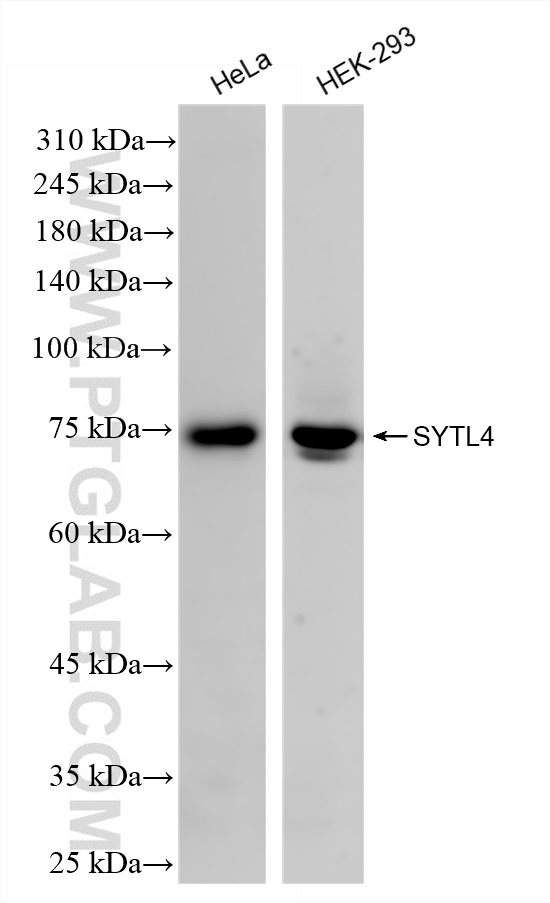验证数据展示
经过测试的应用
| Positive WB detected in | HeLa cells, HEK-293 cells |
推荐稀释比
| 应用 | 推荐稀释比 |
|---|---|
| Western Blot (WB) | WB : 1:500-1:3000 |
| It is recommended that this reagent should be titrated in each testing system to obtain optimal results. | |
| Sample-dependent, Check data in validation data gallery. | |
产品信息
83564-5-RR targets SYTL4 in WB, ELISA applications and shows reactivity with human samples.
| 经测试应用 | WB, ELISA Application Description |
| 经测试反应性 | human |
| 免疫原 | SYTL4 fusion protein Ag2772 种属同源性预测 |
| 宿主/亚型 | Rabbit / IgG |
| 抗体类别 | Recombinant |
| 产品类型 | Antibody |
| 全称 | synaptotagmin-like 4 |
| 别名 | synaptotagmin like 4, SLP4, Granuphilin, Exophilin-2, Exophilin 2 |
| 计算分子量 | 671 aa, 76 kDa |
| 观测分子量 | 74-76 kDa |
| GenBank蛋白编号 | BC014913 |
| 基因名称 | SYTL4 |
| Gene ID (NCBI) | 94121 |
| RRID | AB_3671179 |
| 偶联类型 | Unconjugated |
| 形式 | Liquid |
| 纯化方式 | Protein A purfication |
| UNIPROT ID | Q96C24 |
| 储存缓冲液 | PBS with 0.02% sodium azide and 50% glycerol , pH 7.3 |
| 储存条件 | Store at -20°C. Stable for one year after shipment. Aliquoting is unnecessary for -20oC storage. |
背景介绍
SYTL4, also known as SLP4 or granuphilin, is a member of the synaptotagmin-like protein (Slp) family. Members of this family are characterized by presence of an N-terminal Slp homology domain (SHD), which functions as a Rab27-binding domain, and C-terminal tandem C2 domains, putative Ca(2+)-binding motifs. SYTL4 is specifically expressed on dense-core granules in certain neuroendocrine cells and negatively controls dense-core vesicle exocytosis through specific interaction with Rab27A. (PMID: 16481396; 16473610)
实验方案
| Product Specific Protocols | |
|---|---|
| WB protocol for SYTL4 antibody 83564-5-RR | Download protocol |
| Standard Protocols | |
|---|---|
| Click here to view our Standard Protocols |

